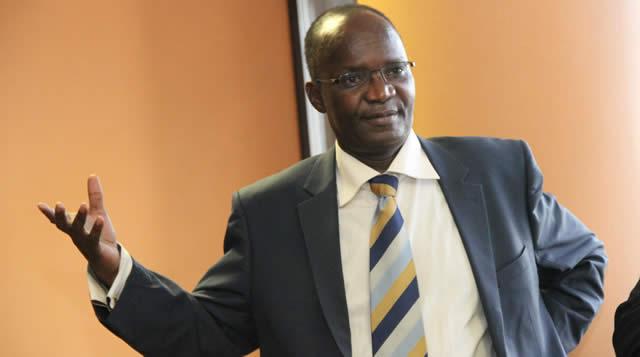News / Local
Who runs Zimbabwean politics
07 Apr 2025 at 19:25hrs |
0 Views

In the ever-contentious debate over who truly wields power in Zimbabwe - civilian politicians or the military - former cabinet minister and Zanu PF politburo member Professor Jonathan Moyo has weighed in with a firm assertion: politics must always lead the gun, not the other way around.
While acknowledging the military's enduring influence in Zimbabwe's post-independence leadership transitions and political affairs, Prof Moyo argues that allowing the gun to dominate politics is a dangerous aberration that runs counter to the values and legacy of the liberation struggle.
"In Zimbabwe's national liberation struggle, politics commanded the gun - not the other way around," Moyo writes, insisting that it was the political leadership and ideology of the liberation movements that ultimately secured independence in 1980, through nzira dzemasoja - the guiding ethos of the freedom fighters.
His comments come as Zimbabwe continues to grapple with the murky relationship between the military and the ruling Zanu PF party, with many pointing to the military's decisive role in the 2017 coup that ousted long-time leader Robert Mugabe and installed President Emmerson Mnangagwa.
Yet, despite the military's involvement in such seismic political events, Moyo maintains that this is not - and should never be - the norm.
"It is an aberration, not a principle, for the gun to command politics," he states. "The gun should never dabble in politics. It is neither in the letter nor the spirit of the solemn promise of nzira dzemasoja."
Moyo warns that allowing the military to take the lead in political matters undermines the fundamental goals of the liberation struggle - especially the people's right to self-determination, freedom, and sovereignty.
He goes further to assert that any deviation from the principle of civilian control over the military is not only unconstitutional but poses a threat to good governance, national unity, and democratic accountability.
"In this connection," he explains, "the command of the gun by politics is a priceless national heritage rooted in the Zimbabwean liberation tradition. It must reign supreme in our constitutional order and political practice - forever."
While Moyo acknowledges the deep and often opaque involvement of the military in the country's political affairs - a subject of long-standing analysis by academics, journalists, and citizens alike - he is adamant that Zimbabwe must return to and uphold the founding principle that politics must lead.
His intervention adds a sharp contrast to the views of critics like journalist Hopewell Chin'ono, who recently argued that the military has always had the final say in Zimbabwean politics - from the liberation war to the modern-day power struggles within Zanu PF.
As the debate continues to rage across public forums, the question of who truly runs Zimbabwe remains unresolved. But for Moyo, the answer is clear: it must be the people - through their elected leaders - and never the barrel of a gun.
While acknowledging the military's enduring influence in Zimbabwe's post-independence leadership transitions and political affairs, Prof Moyo argues that allowing the gun to dominate politics is a dangerous aberration that runs counter to the values and legacy of the liberation struggle.
"In Zimbabwe's national liberation struggle, politics commanded the gun - not the other way around," Moyo writes, insisting that it was the political leadership and ideology of the liberation movements that ultimately secured independence in 1980, through nzira dzemasoja - the guiding ethos of the freedom fighters.
His comments come as Zimbabwe continues to grapple with the murky relationship between the military and the ruling Zanu PF party, with many pointing to the military's decisive role in the 2017 coup that ousted long-time leader Robert Mugabe and installed President Emmerson Mnangagwa.
Yet, despite the military's involvement in such seismic political events, Moyo maintains that this is not - and should never be - the norm.
"It is an aberration, not a principle, for the gun to command politics," he states. "The gun should never dabble in politics. It is neither in the letter nor the spirit of the solemn promise of nzira dzemasoja."
Moyo warns that allowing the military to take the lead in political matters undermines the fundamental goals of the liberation struggle - especially the people's right to self-determination, freedom, and sovereignty.
He goes further to assert that any deviation from the principle of civilian control over the military is not only unconstitutional but poses a threat to good governance, national unity, and democratic accountability.
"In this connection," he explains, "the command of the gun by politics is a priceless national heritage rooted in the Zimbabwean liberation tradition. It must reign supreme in our constitutional order and political practice - forever."
While Moyo acknowledges the deep and often opaque involvement of the military in the country's political affairs - a subject of long-standing analysis by academics, journalists, and citizens alike - he is adamant that Zimbabwe must return to and uphold the founding principle that politics must lead.
His intervention adds a sharp contrast to the views of critics like journalist Hopewell Chin'ono, who recently argued that the military has always had the final say in Zimbabwean politics - from the liberation war to the modern-day power struggles within Zanu PF.
As the debate continues to rage across public forums, the question of who truly runs Zimbabwe remains unresolved. But for Moyo, the answer is clear: it must be the people - through their elected leaders - and never the barrel of a gun.
Source - onloine
Join the discussion
Loading comments…































